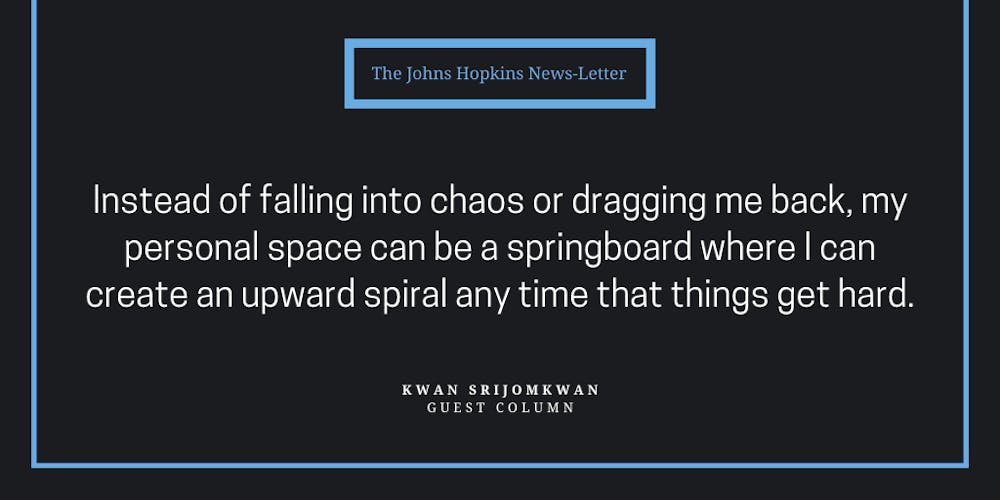
At the beginning of my sophomore year, when I got off my taxi after 24 hours in airports and on flights, I discovered that my dorm had burned and the water damage from the firefighting rendered my room unlivable.
Most people living in on-campus housing this year know about the Scott-Bates Commons fire. I count myself among the more fortunate cases because my 16-hour flight had been delayed and there was a traffic accident on the way to campus, which meant I hadn’t moved in yet when the fire happened and damaged many students’ property. I was promptly taken to the Inn at the Colonnade via shuttle, and, overall, the worst thing that happened was the stress of having to move in after classes had picked up.
During this period, minimalism helped me for the umpteenth time in my life.
After 10 days sharing a hotel room with my roommate — a room not designed for any significant period of habitation — we finally moved in to our dorm. On that day, I had an 11 a.m. class and a packed schedule. Since the move-in only started at 10 a.m., I knew I had very limited time to get all my stuff over and settled.
As an international student, moving has always been stressful because I have no driver’s license, can’t rent a car, have no family to help me and don’t know enough to tell which commercial services are safe to use yet.
But on this occasion, because I didn’t own much, I was able to carry my things to Scott-Bates Commons in two trips, one on foot and another filling two seats on a shuttle. In an hour, I had gotten my keys, moved in and was ready for the day. That night, the unpacking took only an hour or so.
This may seem like a small benefit to a lot of people; I save some stress when I move, but so what?
However, as a person who lives with depression, minimalism has been indispensable to me. It stands to greatly benefit others as well. To me, minimalism is an investment; I spend a lot of effort at once to declutter, as well as small amounts of effort consistently to maintain a clutter-free life, but I am repaid in dividends on the stress, time and money I am able to save.
Chores become easier. Laundry is quick and efficient. Cooking is easier when nothing threatens to fall out of cabinets. It is easy to clean floors when nothing needs to be picked off of it first. Cleaning the bathroom is streamlined. Picking out clothes requires less effort. I barely lose things or forget where things are. No extra storage is needed to keep everything organized.
The thing that helped me the most was the fact that, even after weeks of crazy midterms or extended sickness, it’s almost impossible for things to get super messy. There just was not enough stuff to make that happen.
Even through months-long depressive episodes, no matter how busy things get or how difficult life becomes, minimalism helps me ensure that my living space is hygienic and supportive, ready to be pristine again whenever I can muster some effort to get life back together.
Instead of falling into chaos or dragging me back, my personal space can be a springboard where I can create an upward spiral any time things get hard.
I discovered minimalism in high school when I was living five days a week on campus and spending the weekends at my aunt's house nearby. Managing two living spaces that were not entirely my own and two sets of items that I couldn’t carry back and forth was stressful, so I was looking for a way to minimize that stress and manage things better.
That’s when I came across Joshua Becker’s book The Minimalist Home. Although it was written more for homeowners and not teenagers in my situation, that book was life changing for me.
As a girl, I’ve always felt the pressure to be more neat and tidy than my brother and my male classmates. Whenever my space grows messy, I would think it’s my fault that I can’t keep it up. I should clean more, organize better and be a better person.
But this mentality only creates resentment and makes upkeep even harder. Minimalism taught me that it is not necessarily my fault or that I’m doing something wrong — it’s just that I have too much stuff to manage.
So I started shopping less and less and decluttering or donating my things. After a couple years of practice with that, I started applying minimalism to my digital space, work and hobbies, being more intentional about what I choose to spend my time on.
I didn’t know then that minimalism would help me through high school, depression, my move to the U.S. with my two suitcases and a backpack and would continue to help me navigate the crazy-packed life at Hopkins by minimizing the effort that I have to spend on unnecessary work.
I understand that minimalism might not be for everyone, but, if any of this resonates with you, I’d encourage you to check minimalism out because it has been life-changing for me. Maybe it will be for you too.
If you are interested, The Minimal Mom, Matt D’Avella and Clutterbug are some of my favorite minimalism and organization YouTube channels that helped a lot in my minimalism journey.
Kwan Srijomkwan is a sophomore from Phichit, Thailand majoring in Cognitive Science.





